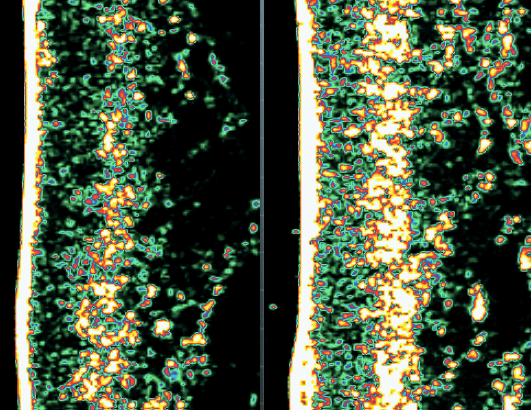Collagen
Collagen is a strengthening protein fibre found throughout the body, in bones, teeth, artery walls, cartilage, ligaments, tendons – and skin. In the skin collagen determine plumpness and structure, effectively keeping gravity at bay. Closely associated with skin thickness, another typical marker of youth, collagen levels begin to decline in our mid-twenties with the loss-rate accelerating as we age. If you’ve ever wondered whether your products are actually having an effect on your collagen structure, Skin Lab can take an ultrasound ‘snapshot’ and give you an accurate answer. We can identify your collagen levels, skin thickness, and give you a dynamic picture of how your measurements change over time.
Collagen is a vital protein fiber found throughout the body, including bones, teeth, artery walls, cartilage, ligaments, tendons, and skin. In the skin, collagen is crucial for maintaining plumpness and structure, effectively combating the effects of gravity. It is closely associated with skin thickness, another typical marker of youth. Collagen levels begin to decline in our mid-twenties, with the loss rate accelerating as we age. If you’ve ever wondered whether your products are impacting your collagen structure, Skin Lab can take an ultrasound ‘snapshot’ to give you an accurate assessment. We can identify your collagen levels, skin thickness, and provide a dynamic picture of how your measurements change over time.
Understanding Collagen
What is Collagen? Collagen is a type of protein that is abundant in the skin and plays a key role in skin elasticity and firmness. It helps give the skin its structure, and as we age, our bodies produce less collagen, resulting in sagging, wrinkles, and a loss of skin firmness.
Measuring Collagen in the Skin
Skin collagen can be measured scientifically using various methods, including:
Densitometry: This method uses X-rays to measure the density of collagen in the skin.
Ultrasonography: This method uses high-frequency sound waves to measure the thickness of the skin and the quantity of collagen within it.
Raman Spectroscopy: This method uses a laser to measure the vibrational spectrum of the skin and provides information about the chemical composition of the skin, including the amount of collagen.
Biopsy: This method involves taking a small sample of skin tissue and analyzing it under a microscope to determine the amount and quality of collagen.
These methods provide a scientific and objective way to measure skin collagen, helping to determine the effectiveness of anti-aging treatments and to monitor changes in skin health over time.
The Role of Skin Lab
At Santi, our Skin Lab uses advanced technology to assess your skin’s collagen levels and overall health. By providing precise measurements of your skin’s elasticity, thickness, and collagen content, we can tailor treatments to effectively address your specific needs. Whether you’re using anti-aging products or undergoing treatments, our detailed assessments can help you understand their impact on your skin over time.
Enhance Your Skin’s Collagen with Santi
With our state-of-the-art Skin Lab technology, you can track your skin’s health and make informed decisions about your skincare routine. Visit Santi in South Kensington for a comprehensive skin assessment and personalized treatment plan to maintain your skin’s youthful vitality.
Santi London, 33 Thurloe Street, London SW7 2LQ Appointments: 0207 5847000 info@santilondon.com

